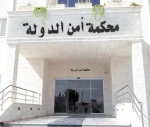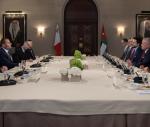You are here
Trump’s Gulf visit: Syria emerges as the unexpected winner
May 19,2025 - Last updated at May 19,2025
Amid the political and media noise, domestic, regional and international, the most notable outcome of U.S. President Donald Trump’s visit to the Arabian Gulf last week was not felt in the Gulf itself, but in Syria.
Trump announced a freeze and partial easing of sanctions on Damascus. While this measure falls short of full repeal, given legal constraints in the U.S, even a temporary freeze is a significant lifeline for Syria’s struggling economy. Economically vital and politically symbolic, the decision could signal a shift in how Washington views Syria, at least for now.
Strategically, the move suggests a brief disengagement between the American perspective on Syria and the aggressive agenda of Israeli Prime Minister Benjamin Netanyahu. Through military action, lobbying efforts, and allies within the U.S. administration, Netanyahu has long sought to frame the Syrian regime as a destabilizing force. He has argued that Israeli policies, including those leveraging sectarian and minority dynamics, are essential for American and Israeli interests alike.
The decision to ease sanctions follows months of behind-the-scenes regional diplomacy. Jordan and Qatar played key roles in re-legitimising the Syrian regime, but it was Saudi Arabia and Turkey that led a pivotal regional alignment pushing for Syria’s reintegration. Their efforts appear to have succeeded, at least partially, in convincing Washington to shift course. The outcome not only strengthens the Syrian state but weakens the influence of internal and external actors still clinging to regime-change fantasies.
Although economic recovery will be slow, the sanctions freeze provides much-needed breathing
Still, Netanyahu remains determined to weaken or dismantle the Syrian state. He will likely continue working through pro-Israel circles in Washington to undermine Trump’s decision or link it to new conditions. For Netanyahu, a fragmented, militarily impotent Syria is the only acceptable outcome.
Syrian President Ahmad Al-Sharaa and his inner circle appear acutely aware of the external power imbalances. Their strategy focuses on internal stability, securing regional backing, and avoiding any direct confrontation with Israel, buying time and neutralising efforts to divide the country along ethnic or sectarian lines. The real battle is now unfolding behind closed doors in Washington, even as European support for Syria's reemergence grows stronger and more vocal.
Meanwhile, exaggerated hopes, fuelled by American and Israeli leaks, of a decisive US pivot on Gaza have collapsed. The notion that Washington would rein in Netanyahu or halt the assault on Gaza proved illusory. Despite Hamas’ goodwill gesture in releasing Israeli-American soldier Aidan Alexander, Israel pressed forward with its “Gideon’s Chariots” operation, aimed at depopulating Gaza and imposing a new status quo before any real U.S. pressure could materialise.
There is little evidence of a fundamental shift in Trump’s Gaza policy. Some media reports have overstated internal divisions between Trump and Netanyahu. While disagreements do exist, Trump’s remarks during his Gulf tour suggest he still supports Netanyahu’s vision, speaking euphemistically about creating a “Land of Freedom” in Gaza, a phrase widely interpreted as code for displacement.
Indeed, the final days of Trump’s visit were marked by an intensification of Israeli strikes on Gaza and the West Bank, reinforcing that no real change in American policy is imminent.
In Syria, Arab and Turkish efforts must now capitalise on the policy opening created by Trump’s decision. Sustained coordination and economic support will be crucial to solidifying Syria’s recovery and regional reintegration.
In Gaza, regional and international actors must ramp up efforts to halt what increasingly resembles a campaign of extermination. Netanyahu is expected to escalate militarily, using force to distract from his political troubles and neutralize domestic criticism following the release of Aidan Alexander.
For both Syria and Palestine, the stakes have never been higher. The next chapter hinges not only on U.S. actions but on whether regional players can transform momentary openings into long-term strategy.












Add new comment